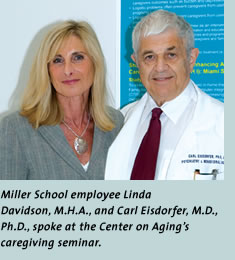Center on Aging Reaches Out with
‘Caring
for Our UM Caregivers’ Seminar
 ith
her mother left immobile after emergency surgery, Miller School employee
Linda Davidson, M.H.A, was torn about whether to bring her home or
send her to a skilled nursing facility. But realizing her mother, now
88, would need nearly constant care, Davidson was forced to choose
the nursing home.
ith
her mother left immobile after emergency surgery, Miller School employee
Linda Davidson, M.H.A, was torn about whether to bring her home or
send her to a skilled nursing facility. But realizing her mother, now
88, would need nearly constant care, Davidson was forced to choose
the nursing home.
 What Davidson didn’t know, however, was she would still need to
take charge of her mother’s care—making significant, almost
daily, financial, health care, and myriad other decisions that were often
difficult, such as those involving Medicare.
What Davidson didn’t know, however, was she would still need to
take charge of her mother’s care—making significant, almost
daily, financial, health care, and myriad other decisions that were often
difficult, such as those involving Medicare.
“Thank God, Mom survived, but I wasn’t prepared for what was to come,” Davidson said. “I was really beside myself even though I was in the health care field.” Davidson, associate director for administration and finance in the Department of Pediatrics, relayed her personal journey at “Caring for Our UM Caregivers,” a seminar organized by the Miller School’s Center on Aging and the University’s Employee Assistance Program. The event, held at the Center on Aging on August 14, was designed as a forum for conversation and feedback and to introduce employees to the University’s many resources and experts, including Carl Eisdorfer, M.D., Ph.D., Knight Professor and director of the Center on Aging, and Sara Czaja, Ph.D., professor of psychiatry and behavioral sciences and co-director of the center.
In Davidson’s case, seminar speakers Sally Philips, Ed.D., CEAP, director of the Employee Assistance Program, and Adrienne Goldberg, M.S.P.H., administrative director for the Center on Aging, directed her to resources at UM. Among the helpful books they recommended was Seven Steps to Effective Parent Care: A Planning Guide for Adult Children with Aging Parents, co-written by Eisdorfer.
Eisdorfer’s talk included tips for caregivers and warning signs that indicate when caregiving is becoming too stressful. “Rule No. 1,” he said, “You cannot do it alone.” Some speakers encouraged employees to look into numerous online resources and caregiving research projects being undertaken at UM.
It is estimated that about 22 million family caregivers live in the
United States; two-thirds of them work full- or part-time.